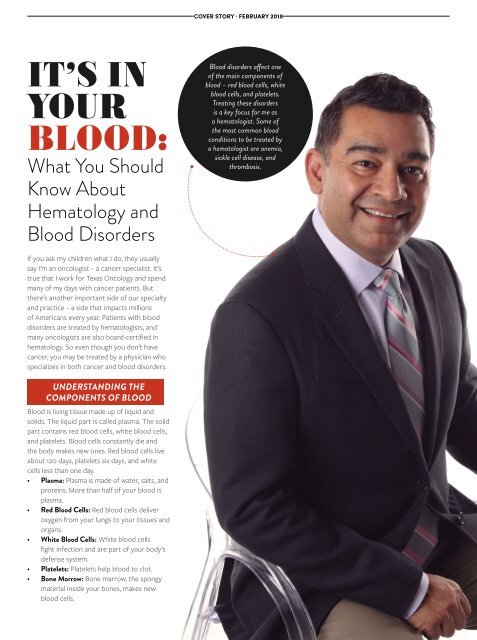Healthy RGV Issue 111- It's in Your Blood, What You Should Know About Hematology and Blood Disorders
You also want an ePaper? Increase the reach of your titles
YUMPU automatically turns print PDFs into web optimized ePapers that Google loves.
COVER STORY · FEBRUARY 2018<br />
IT’S IN<br />
YOUR<br />
BLOOD:<br />
<strong>What</strong> <strong>You</strong> <strong>Should</strong><br />
<strong>Know</strong> <strong>About</strong><br />
<strong>Hematology</strong> <strong>and</strong><br />
<strong>Blood</strong> <strong>Disorders</strong><br />
<strong>Blood</strong> disorders affect one<br />
of the ma<strong>in</strong> components of<br />
blood – red blood cells, white<br />
blood cells, <strong>and</strong> platelets.<br />
Treat<strong>in</strong>g these disorders<br />
is a key focus for me as<br />
a hematologist. Some of<br />
the most common blood<br />
conditions to be treated by<br />
a hematologist are anemia,<br />
sickle cell disease, <strong>and</strong><br />
thrombosis.<br />
If you ask my children what I do, they usually<br />
say I’m an oncologist – a cancer specialist. It’s<br />
true that I work for Texas Oncology <strong>and</strong> spend<br />
many of my days with cancer patients. But<br />
there’s another important side of our specialty<br />
<strong>and</strong> practice – a side that impacts millions<br />
of Americans every year. Patients with blood<br />
disorders are treated by hematologists, <strong>and</strong><br />
many oncologists are also board-certified <strong>in</strong><br />
hematology. So even though you don’t have<br />
cancer, you may be treated by a physician who<br />
specializes <strong>in</strong> both cancer <strong>and</strong> blood disorders.<br />
UNDERSTANDING THE<br />
COMPONENTS OF BLOOD<br />
<strong>Blood</strong> is liv<strong>in</strong>g tissue made up of liquid <strong>and</strong><br />
solids. The liquid part is called plasma. The solid<br />
part conta<strong>in</strong>s red blood cells, white blood cells,<br />
<strong>and</strong> platelets. <strong>Blood</strong> cells constantly die <strong>and</strong><br />
the body makes new ones. Red blood cells live<br />
about 120 days, platelets six days, <strong>and</strong> white<br />
cells less than one day.<br />
• Plasma: Plasma is made of water, salts, <strong>and</strong><br />
prote<strong>in</strong>s. More than half of your blood is<br />
plasma.<br />
• Red <strong>Blood</strong> Cells: Red blood cells deliver<br />
oxygen from your lungs to your tissues <strong>and</strong><br />
organs.<br />
• White <strong>Blood</strong> Cells: White blood cells<br />
fight <strong>in</strong>fection <strong>and</strong> are part of your body’s<br />
defense system.<br />
• Platelets: Platelets help blood to clot.<br />
• Bone Morrow: Bone marrow, the spongy<br />
material <strong>in</strong>side your bones, makes new<br />
blood cells.<br />
14 HEALTHY MAGAZINE
















